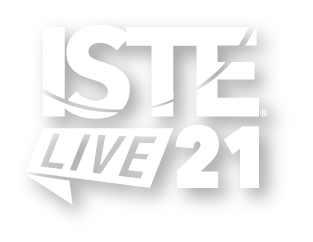

Teaching, Learning and Changing: Adaptive Changes in the COVID-19 Pandemic |
Participate and share : Poster
Dr. Angela Elkordy Dr. Jack Denny Dr. Ayn Keneman Donna Wakefield
Beginning in March 2020 with the onset of the COVID-19 pandemic, educational systems nationwide were disrupted. Schools were forced to adapt to an array of remote/hybrid learning options, pivoting rapidly. Our exploratory research explores these adaptive challenges, innovations and impacts, emerging from our work with educators and school leaders.
| Audience: | Teachers, Teacher education/higher ed faculty, Principals/head teachers |
| Skill level: | Beginner |
| Attendee devices: | Devices not needed |
| Topic: | Reimagining learning |
| ISTE Standards: | For Education Leaders: Equity and Citizenship Advocate
|
| Additional detail: | ISTE author presentation |
The COVID-19 pandemic has disrupted traditional formats of teaching and learning in all contexts. In the midst of the adaptive challenges faced by K-12, higher education, and specialized educators beginning in March 2020, educators and school leaders continue to innovate with the use of digital tools, technologies and learning environments. In the field of education, a distinct shift is occurring to focus on learners' capacities and characteristics using evidence-based instructional practices. As researcher-practitioners within a College of Education, we are conducting research to support our in-service teacher and school leaders learners, as they identify and problem-solve unique and adaptive challenges in meeting the needs of their students.
Due to the unanticipated nature of the COVID-19 school closures, schools have been engaging in rapid prototyping of educational remote, elearning and hybrid designs. The situation has been changing rapidly as schools make adjustments during the course of implementation and planning for the remainder school year. Our goal, in this rapidly evolving context, is to collect and analyze data to inform our understanding of the following research questions:
1. In what ways are schools implementing remote learning?
a. How is remote learning being implemented as elearning?
b. How are educators using digital tools and pedagogies in remote learning?
c. How do teachers’ engage students in learning processes?
2. How are schools supporting the transition to remote learning to ensure every students’ success?
a. What are some of the educators’ most immediate learning needs in digital tools and pedagogy to support ongoing remote learning?
b. What administrative supports are needed for teachers to effectively implement elearning?
c. What are the perceptions of parents and students about their experiences?
d. What are emerging themes in school COVID-19 response policies that support teaching and learning?
Our preliminary results have indicated a wide range of designs for instructional programs, including completely online or remote learning, with or without synchronous learning opportunities, hybrid models where students may attend school part time and learn online. We are gathering data through the winter using a mixed methods approach, looking at digital artifacts, surveying educators and following up with focus groups.
Our objectives in this presentation are to share our findings to the above research questions, particularly promising strategies, approaches and practices as framed through an diversity, equity and inclusion lens.
1. . Learners will stay current with research that supports improved student learning outcomes, including findings from the learning sciences.
2. Learners will be able to set professional goals to explore and apply pedagogical approaches made possible by the learning sciences and digital technologies, reflecting on their effectiveness
3. Learners will reflect on professional learning opportunities for others around ideas from the learning principles, technology effectiveness and digital learning in their own leadership context
4. Learners will consider autthentic evidence to demonstrate growth in learning when using digital tools and technologies.
Armitage, R., & Nellums, L. B. (2020). Considering inequalities in the school closure response to COVID-19. The Lancet Global Health, 8(5), e644.
Blakemore, S. J., Grossmann, T., Cohen-Kadosh, K., Sebastian, C., & Johnson, M. H. (2013). Social development, (pp. 268–295) in Educational neuroscience. Mareschal, D., Butterworth, B., & Tolmie, A. (Eds.). New York: John Wiley & Sons.
Center for Disease Control (2020). Considerations for schools. Retrieved from: (https://www.cdc.gov/coronavirus/2019-ncov/community/schools-childcare/schools.html
Cohen, J. & Richards, J.S. (April 20, 2020). Illinois districts were urged to prepare e-learning plans for students in case of emergency. Most didn’t do it. Retrieved from: https://www.chicagotribune.com/coronavirus/ct-coronavirus-illinois-schools-elearning-20200420-klfsji4jfzdafdpylvkcffx3sq-story.html
Crawford, J., Butler-Henderson, K., Rudolph, J., Malkawi, B., Glowatz, M., Burton, R., ... & Lam, S. (2020). COVID-19: 20 countries' higher education intra-period digital pedagogy responses. Journal of Applied Learning & Teaching, 3(1), 1-20.
Elkordy, A. & Keneman, A., (2019). Design ed: Connecting learning sciences research to practice. Portland, OR: ISTE
Fortuna, L. R., Tolou-Shams, M., Robles-Ramamurthy, B., & Porche, M. V. (2020). Inequity and the disproportionate impact of COVID-19 on communities of color in the United States: The need for a trauma-informed social justice response. Psychological Trauma: Theory, Research, Practice, and Policy.
Harris, D. (April 24, 2020). How will COVID-19 change our schools in the long run? Retrieved from: https://www.brookings.edu/blog/brown-center-chalkboard/2020/04/24/how-will-covid-19-change-our-schools-in-the-long-run/
Hart, C., & Nash, F. (2020). Teacher Resilience during COVID: Burnout and Trauma.
Melnick, H., & Darling-Hammond, L. (with Leung, M., Yun, C., Schachner, A., Plasencia, S., & Ondrasek, N.). (2020). Reopening schools in the context of COVID-19: Health and safety guidelines from other countries (policy brief). Palo Alto, CA: Learning Policy Institute.
Petretto, D. R., Masala, I., & Masala, C. (2020). Special Educational Needs, Distance Learning, Inclusion and COVID-19.)
World Health Organization. (2020). WHO Director-General’s opening remarks at the mission briefing on COVID-19. Retrieved from: https://www.who.int/dg/speeches/detail/who-director-general-s-opening-remarks-at-the-mission-briefing-on-covid-19---12-march-2020



Dr. Ayn Keneman is a Professor and Program Chair of Early Childhood Education at National Louis University in Chicago. She has 25 years of teaching experience in public and private schools in Trenton, N,J.. Atlanta Ga. and Winnetka,IL. as an ECE teacher and Reading/Learning Disability specialist. She presents annually at ISTE and ICS conferences and is a former SIG President of the International Literacy Association ( ILA). She attended the National Technology Leadership Summit for the past five years. Her latest book, Design Ed: Connecting Learning Science to Research was published by ISTE in 2019.


Dr. Donna Wakefield is a professor of special education at National Louis University in Chicago, Illinois where she teaches graduate courses in language, literacy, assistive technology and differentiation. She worked in the K-12 setting as a speech-language pathologist, special education teacher, assistive technology facilitator, inclusion facilitator and special education administrator before joining the university. Donna teaches the meaningful integration of technology into academics . Donna has presented at numerous national and international conferences to teachers, administrators and tech enthusiasts and is an ISTE Certified Educator, a Google for Education Certified Trainer and an Apple Teacher.
4 C the Future: Lesson Design That Empowers
Educators' Interests, Knowledge and Questions Regarding AR, VR and 3D Printing
Lessons Learned From Pandemic Education: Digital Tools to Ensure Learning Happens Everywhere